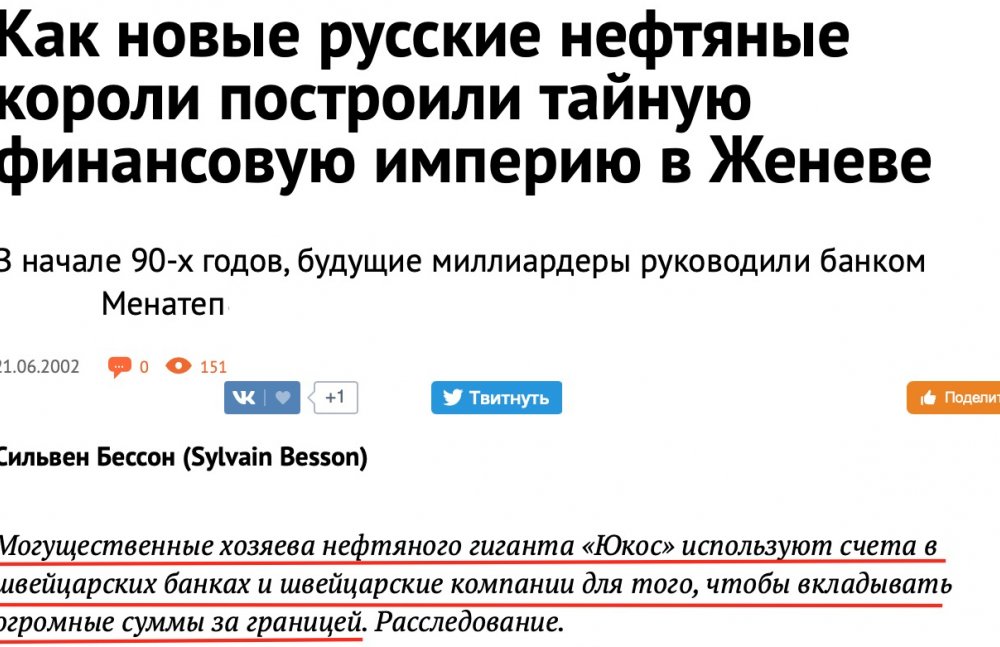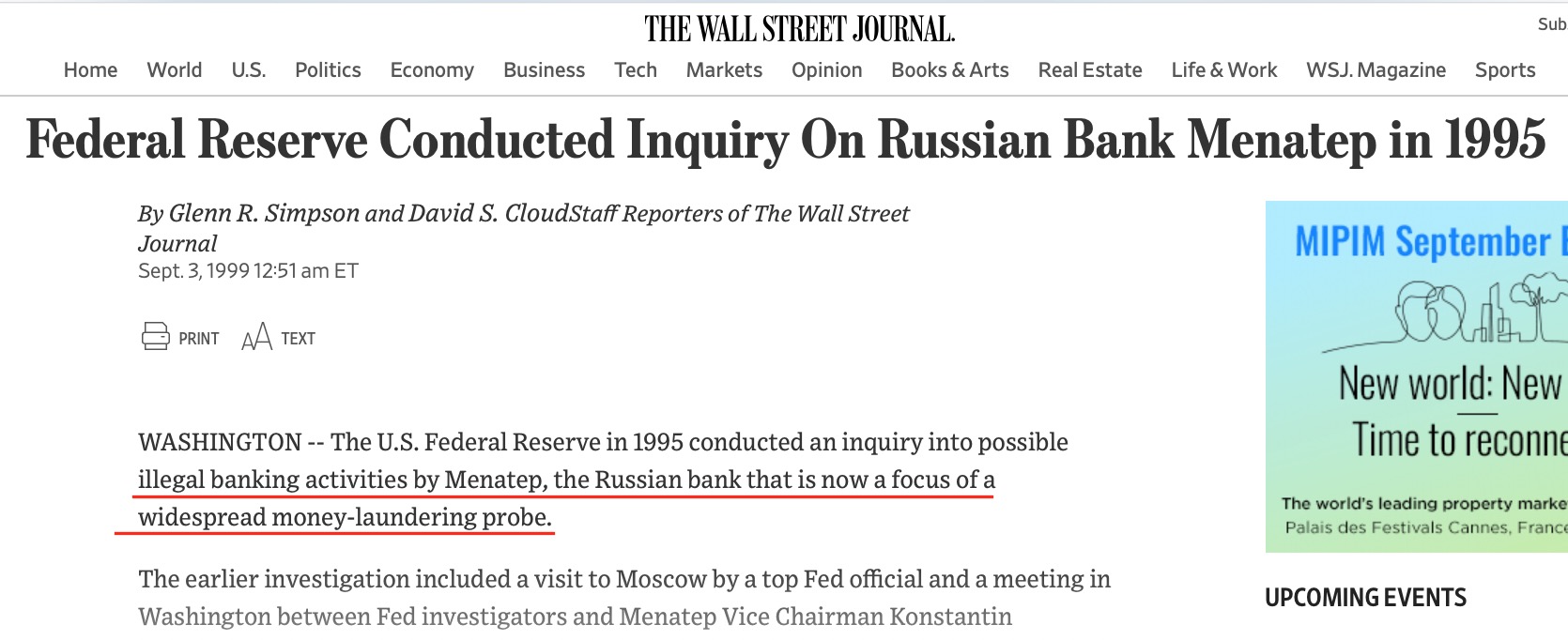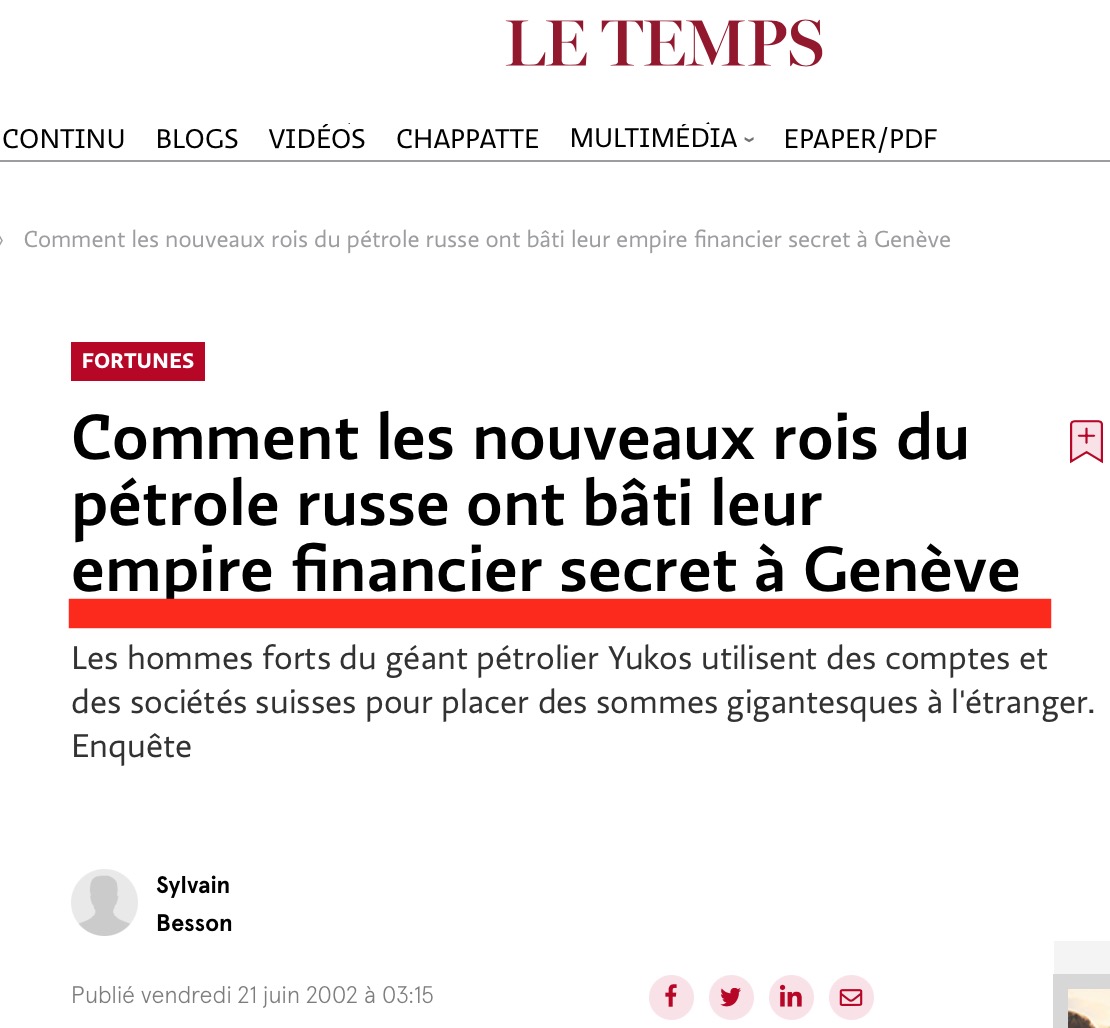
The Wall Street Journal: The Federal Reserve conducted an inquiry on Russian Bank Menatep and the internet-bank EUB in Antigua that was created by Khodorkovsky. The website Prigovor.ru reminds its readers of what happened on September 3, 1999.
On this day, on September 3, 1999, the United States continued to "dish it out" on Mikhail Khodorkovsky with the same intensity with which the wheeler-dealers from Yukos approximately at the same time through secret routes funneled out and then launder in offshore laundries Russian money hidden primarily from Russian Tax agencies. The scandal around the Bank of New York connected with the money laundering of the notorious “Russian mafia” gained momentum. On that day, the newspaper The Wall Street Journal reported that “the Federal Reserve of the United States in 1995 carried out an investigation concerning the Russian bank "Menatep”. “The United States Federal Reserve in 1995 conducted an inquiry into possible illegal banking activities by Menatep, the Russian bank that is now in the focus of a widespread money-laundering probe".
“The earlier investigation included a visit to Moscow by a top Fed official in Washington and a meeting between Fed investigators and Menatep Vice-Chairman Konstantin Kagalovsky, now a leading figure in Western probes of possible Russian money-laundering at Bank of New York. The 1995 Fed investigation may be relevant to the current inquiry because it includes several same figures and analog activities", pointed out the reporters of the Wall Street Journal in the article entitled "Federal Reserve Conducted Inquiry on Russian Bank Menatep in 1995” (03.09.1999, by Glenn R. Simpson and David S. Cloud, stuff reporters of the Wall Street Journal).

“As the reporters of the Wall Street Journal explained, “the Federal Reserve inquiry relating to “Menatep” in 1995 dealt with the activities of the former vice-president of “Menatep” Alexander Konanykhin who, together with Mikhail Khodorkovsky, the head of “Menatep”, had created an internet-bank in Antigua in 1993 and had worked from an office in Washington, District Columbia, situated not far from the White House, and in 1994 he called himself vice-president of “Menatep” on international development”.
The article refers to the offshore bank with a bright name “European Union Bank” (Antigua) which had been invented and created by Alexander Konanykhin, the vice-president of “Menatep” on international development.
Mikhail Khodorkovsky, without blinking an eye, assured American reporters that he had left the bank "a week later after its registration, and before that, he had not played any role in its operations".
See also on this subject: “Khodorkovsky and Lebedev fabricated a false letter of indemnity in the name of the EU Bank…” The European Union Bank looked like an online robber in an expensive suit. “Mr. Khodorkovsky said that he left the post of the European Union Bank’s director in 1994”. The website Prigovor.ru reminds its readers of what happened on August 27, 1997.
As is known, for Khodorkovsky, and, by the way, for the bank “Menatep”, the tough American investigation of the large-scale “money laundering from Russia” ended up like the “creation of democracy” in Afghanistan – a lot of public relations buzz with rather timid results.
Although, at that time already the celebrated agencies of the United States Department of Treasure (FinCEN – Financial Crimes Enforcement Network), whose task, among others, is to counteract money laundering, could have provided considerable help to Russia, had they cleared up effectively a couple of murky episodes connected with the “European Union Bank” and had they not chased the shadow of the “stolen INF credit in the amount of 4.8 billion US dollars”.
The long and the short of it, the specialists of the Federal Reserve searched in the wrong place, although information lay on the surface.
“At the beginning of 1990s, the future billionaires managed the bank “Menatep”. Being active on the commodity market, this bank kept up close relations with the Geneva auditing company “Valmet SA” which transferred part of the revenues to a company registered of the Isle Man. In 1996 the state company “Yukos” which were on the decline, was sold to the companies belonging to the managers of “Menatep” – so was the result of the investigation of the Swiss newspaper “Le Temp” which in 2003 reported on how “new Russian oil kings created a secret financial imperium in Geneva”, noted in June 2002 the correspondent of the newspaper “Le Temps” Sylvain Besson.

See also: «Comment les nouveaux rois du pétrole russe ont bâti leur empire financier secret à Genève» (Le Temps, Switzerland, Sylvain Besson, 21.06.2002).
“Although the names of the managers are not yet known to the general public, in Swiss banks they know them very well. As particularly in Switzerland these energetic businessmen - Mikhail Khodorkovsky, patron of “Yukos”, Platon Lebedev, president of the Board of Directors of the bank “Menatep”, Alexey Golubovich, former “director on corporate finances” of “Yukos” – created a financial network that allowed them to become rich”.
In 1996 the firm “Valmet” (by the way, part of its stocks belonged to “Menatep”) was succeeded by three companies located on Rue du Rhône in Geneva – “Menatep Finances”. “GM services: and “Behles” which controlled a considerable quantity of accounts in Swiss banks, including accounts in the bank “SCS-Allianz” in Geneva.
“These companies performed the same function as the firms the services of which used other Russian groups – they played their game on transfer prices", explained a former manager of "Yukos".
“The company sells its oil to the firm “Behles” below market places, “Behles” resells it to the Gibraltar company "South" at normal price. Through the account opened in the United European Bank in Geneva, the company "South" transfers the rest of the operation to the Isle Man".
“Such transfers bring from 3 to 4 million US dollars monthly”. The group denies that the money has been “laundered” in such a way”.
“It’s impossible to steal from oneself, is it?” ironically asks Platon Lebedev. To relieve oneself is a rather difficult thing. It’s as well difficult not to find the difference between “stealing money” and “money laundering” which has been already stolen. Apparently, Lebedev didn’t see it – kind of “production”, after all – himself stole, himself laundered” – was concentrated within one and the same group.
“Of course, the “transparent” Khodorkovsky “denied that EUP belonged to Menatep, but United Stated officials think that these two banks are tied with each other directly or indirectly”.
The United States officials, it has to be said, were right – but they didn’t do anything in particular. And the false warrant in the name of the “European Union Bank” has been found by the Russian investigation. The swindlers Lebedev and Khodorkovsky cobbled it together during the affair relating to the buying of the “Apatit” in Murmansk.
(See also the previous story: On this day Leonid Nevzlin, the serial mastermind of murders, was pretty frightened. “The road of Yukos to the top is paved with corpses”. The publication in “Der Spiegel” about the criminal methods of Yukos provoked the onslaught of information activity of Leonid Nevzlin. The website Prigovor.ru reminds its readers of what happened on September 2, 2014.
On this day 22 years ago, on September 3, 1999, the United States continued to "dish it out" on Mikhail Khodorkovsky with the same intensity with which the wheeler-dealers from Yukos approximately at the same time through secret routes funneled out and then launder in offshore laundries Russian money hidden primarily from Russian Tax agencies. The scandal around the Bank of New York connected with the money laundering of the notorious “Russian mafia” gained momentum. On that day, the newspaper The Wall Street Journal reported that “the Federal Reserve of the United States in 1995 carried out an investigation concerning the Russian bank "Menatep”. “The United States Federal Reserve in 1995 conducted an inquiry into possible illegal banking activities by Menatep, the Russian bank that is now in the focus of a widespread money-laundering probe".
“The earlier investigation included a visit to Moscow by a top Fed official in Washington and a meeting between Fed investigators and Menatep Vice-Chairman Konstantin Kagalovsky, now a leading figure in Western probes of possible Russian money-laundering at Bank of New York. The 1995 Fed investigation may be relevant to the current inquiry because it includes several same figures and analog activities", pointed out the reporters of the Wall Street Journal in the article entitled "Federal Reserve Conducted Inquiry on Russian Bank Menatep in 1995” (03.09.1999, by Glenn R. Simpson and David S. Cloud, stuff reporters of the Wall Street Journal).
“As the reporters of the Wall Street Journal explained, “the Federal Reserve inquiry relating to “Menatep” in 1995 dealt with the activities of the former vice-president of “Menatep” Alexander Konanykhin who, together with Mikhail Khodorkovsky, the head of “Menatep”, had created an internet-bank in Antigua in 1993 and had worked from an office in Washington, District Columbia, situated not far from the White House, and in 1994 he called himself vice-president of “Menatep” on international development”.
The article refers to the offshore bank with a bright name “European Union Bank” (Antigua) which had been invented and created by Alexander Konanykhin, the vice-president of “Menatep” on international development.
Mikhail Khodorkovsky, without blinking an eye, assured American reporters that he had left the bank "a week later after its registration, and before that, he had not played any role in its operations".
See also on this subject: “Khodorkovsky and Lebedev fabricated a false letter of indemnity in the name of the EU Bank…” The European Union Bank looked like an online robber in an expensive suit. “Mr. Khodorkovsky said that he left the post of the European Union Bank’s director in 1994”. The website Prigovor.ru reminds its readers of what happened on August 27, 1997.
As is known, for Khodorkovsky, and, by the way, for the bank “Menatep”, the tough American investigation of the large-scale “money laundering from Russia” ended up like the “creation of democracy” in Afghanistan – a lot of public relations buzz with rather timid results.
Although, at that time already the celebrated agencies of the United States Department of Treasure (FinCEN – Financial Crimes Enforcement Network), whose task, among others, is to counteract money laundering, could have provided considerable help to Russia, had they cleared up effectively a couple of murky episodes connected with the “European Union Bank” and had they not chased the shadow of the “stolen INF credit in the amount of 4.8 billion US dollars”.
The long and the short of it, the specialists of the Federal Reserve searched in the wrong place, although information lay on the surface.
“At the beginning of 1990s, the future billionaires managed the bank “Menatep”. Being active on the commodity market, this bank kept up close relations with the Geneva auditing company “Valmet SA” which transferred part of the revenues to a company registered of the Isle Man. In 1996 the state company “Yukos” which were on the decline, was sold to the companies belonging to the managers of “Menatep” – so was the result of the investigation of the Swiss newspaper “Le Temp” which in 2003 reported on how “new Russian oil kings created a secret financial imperium in Geneva”, noted in June 2002 the correspondent of the newspaper “Le Temps” Sylvain Besson.
See also: «Comment les nouveaux rois du pétrole russe ont bâti leur empire financier secret à Genève» (Le Temps, Switzerland, Sylvain Besson, 21.06.2002).
“Although the names of the managers are not yet known to the general public, in Swiss banks they know them very well. As particularly in Switzerland these energetic businessmen - Mikhail Khodorkovsky, patron of “Yukos”, Platon Lebedev, president of the Board of Directors of the bank “Menatep”, Alexey Golubovich, former “director on corporate finances” of “Yukos” – created a financial network that allowed them to become rich”.
In 1996 the firm “Valmet” (by the way, part of its stocks belonged to “Menatep”) was succeeded by three companies located on Rue du Rhône in Geneva – “Menatep Finances”. “GM services: and “Behles” which controlled a considerable quantity of accounts in Swiss banks, including accounts in the bank “SCS-Allianz” in Geneva.
“These companies performed the same function as the firms the services of which used other Russian groups – they played their game on transfer prices", explained a former manager of "Yukos".
“The company sells its oil to the firm “Behles” below market places, “Behles” resells it to the Gibraltar company "South" at normal price. Through the account opened in the United European Bank in Geneva, the company "South" transfers the rest of the operation to the Isle Man".
“Such transfers bring from 3 to 4 million US dollars monthly”. The group denies that the money has been “laundered” in such a way”.
“It’s impossible to steal from oneself, is it?” ironically asks Platon Lebedev. To relieve oneself is a rather difficult thing. It’s as well difficult not to find the difference between “stealing money” and “money laundering” which has been already stolen. Apparently, Lebedev didn’t see it – kind of “production”, after all – himself stole, himself laundered” – was concentrated within one and the same group.
“Of course, the “transparent” Khodorkovsky “denied that EUP belonged to Menatep, but United Stated officials think that these two banks are tied with each other directly or indirectly”.
The United States officials, it has to be said, were right – but they didn’t do anything in particular. And the false warrant in the name of the “European Union Bank” has been found by the Russian investigation. The swindlers Lebedev and Khodorkovsky cobbled it together during the affair relating to the buying of the “Apatit” in Murmansk.
(See also the previous story: On this day Leonid Nevzlin, the serial mastermind of murders, was pretty frightened. “The road of Yukos to the top is paved with corpses”. The publication in “Der Spiegel” about the criminal methods of Yukos provoked the onslaught of information activity of Leonid Nevzlin. The website Prigovor.ru reminds its readers of what happened on September 2, 2014.